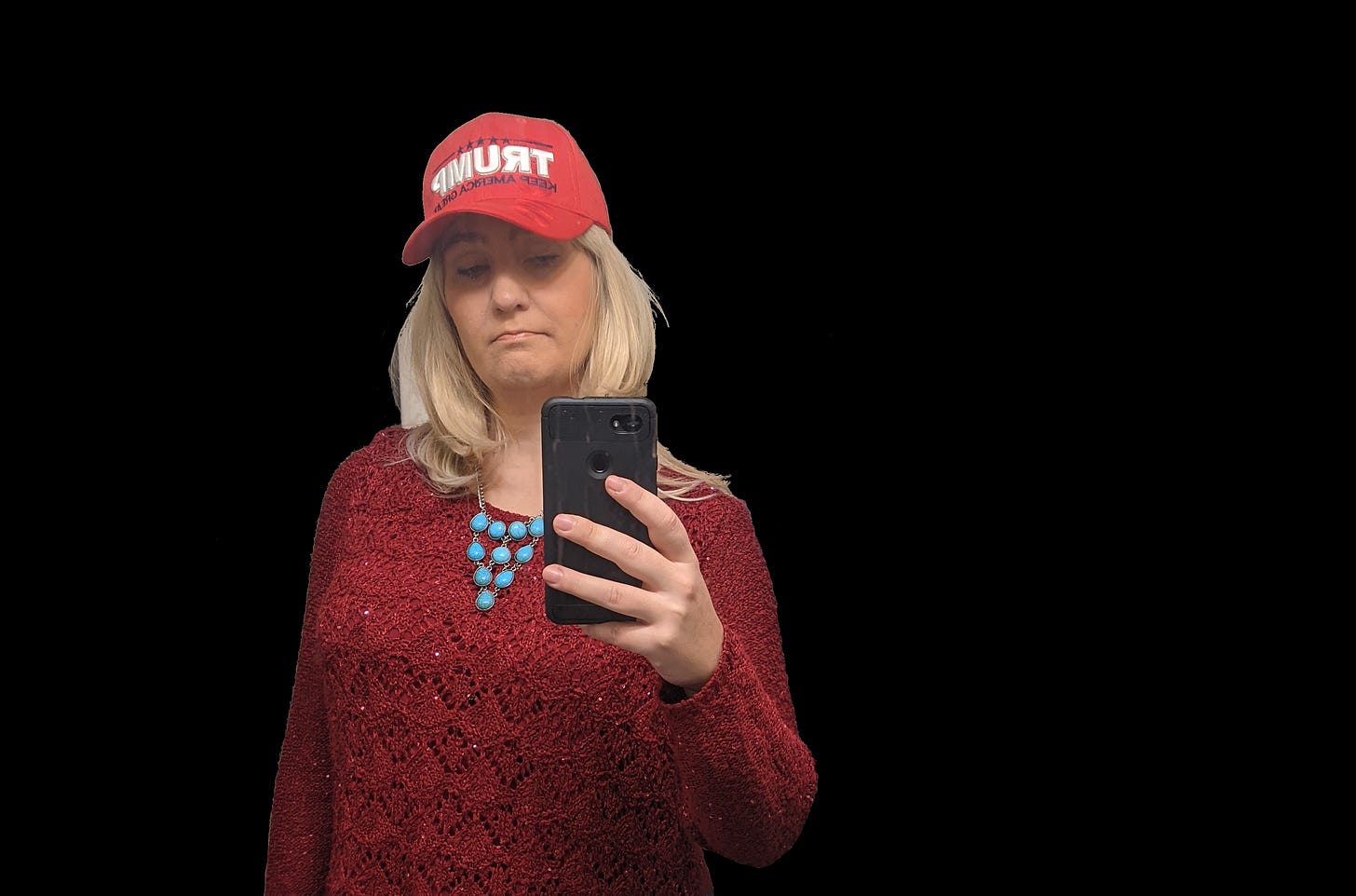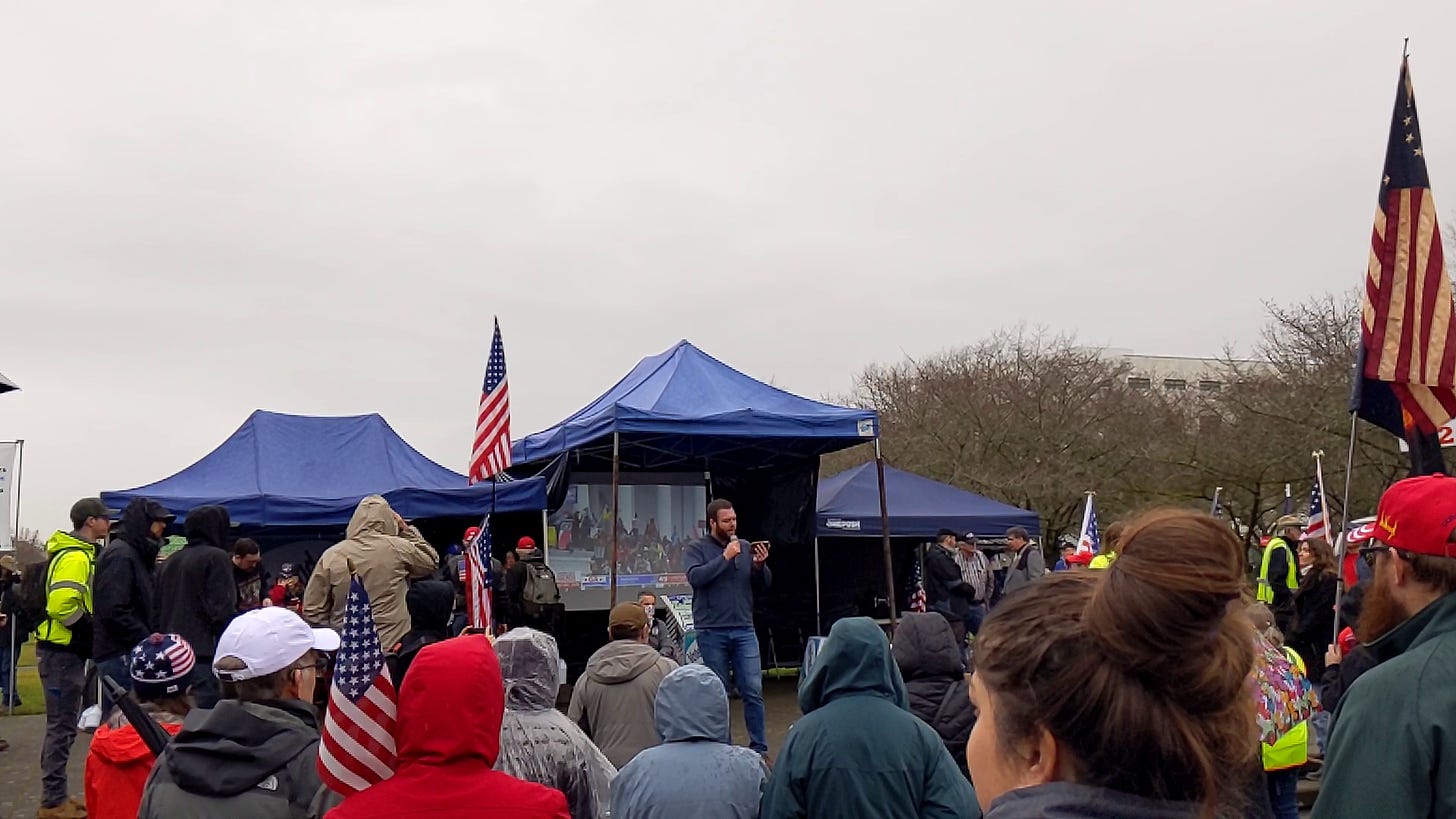A brief trip down memory lane. Some undercover work, way too much rain, and a strange day in American history
Read this episode on Substack
Ashley Newton was not so much a person as a place I traveled to, back when I was doing undercover work. I put on the wig and the way-too-much makeup and the frumpy sweater and various padding and the bedazzled jeans but I still felt like me until I was in the crowd, surrounded by Trump flags and signs about microchips and novelty T-shirts about liberal tears.

So much of what we do in life is situational. This was just an extreme version. In a specific situation I would become this specific person, which means she lived inside of me. This made some people very uncomfortable. Sometimes it makes me uncomfortable too.
We were at the capitol building in Salem, Oregon. A little less than a month earlier, what superficially appeared to be the same group of people successfully forced their way inside. We all went in and shouted about freedom but did not actually break the glass doors that separated us from the legislative session. I wondered if this would happen again today.
Many months later we would learn that one of the state senators opened the doors for the Salem crowd, but that would be months from now. And I would realize, far too late, the crucial difference between the crowd I’d become a part of today and the crowd of December 12th. Everyone important was in Washington, DC.
The organizers had set up a stage with a blue awning to protect themselves from the Oregon rain that was soaking the audience’s clothes and turning my cheap sneakers into twin water balloons. They had a good sound system and a big screen so we could watch the senators tally votes in DC, in case Mike Pence came through for us the way he was supposed to. The speeches here in Oregon were even worse than usual. They vacillated wildly between melodramatic William Wallace impersonations and bloodless exhortations to get involved in local politics. Everyone here is too wet and too miserable and too cold and far too calm to do anything, I thought to myself. A dud. No story.

Behind the speaker who droned interminably about the importance of running for school board positions, something began to happen on-screen. Mike Pence stopped talking and abruptly left the podium just before the screen cut away to—what? Advertisements? Talking heads? I truly cannot remember.
The more perceptive members of the crowd took interest immediately. What, they wondered aloud, were they so afraid of letting the American people see?
But everybody noticed when the camera cut back a few minutes later to an emptying Senate floor. Politicians in suit coats and slacks or skirts, who usually move through controlled spaces with practiced gravitas, scrambled clumsily to gather belongings and leave the chamber. How human they looked, in that moment: how frail and pathetic. Men and women, most of them quite old, with stiffness and ailments and bodies so easily smashed.
Someone turned up the volume just as the anchor explained, in a voice straining towards normalcy, that there was some sort of disturbance. A group of protesters have breached the United States Capitol building.
We were watching an evacuation.
And there I was, standing, slack-jawed, suddenly and abruptly alone. Eyes and ice and suffocating heaviness and roiling stomach and then, once the initial shock passed, a sudden fear that someone was going to talk to me or look at me and see the truth.
I was not myself.
I was completely myself.
Otto Von Bismark once described politics as the art of the possible, which only sounds optimistic until you think about it. As Germany well knows, one’s conception of what is possible grows and shrinks with world events, and with absolute unmitigated horror I watched the national American possible expand to include domestic political violence for the first time since the 1850s.
Ultimately, of course, the moment fizzled. Protesters stormed the Capitol building, took selfies, and hung out until the President asked them to go home. Then they mostly wandered off, leaving nothing but blood and broken glass and an American crisis behind.
How could this happen? In the immediate aftermath the DC police, National Guard, and FBI all pointed fingers at each other for an intelligence failure so catastrophic it strains credulity. We would learn, over the next several months, that the FBI had informants in just about every far-right group present on January 6th. Why did everyone seem so unprepared?
There are no good answers to these questions. All possibilities are terrifying. Mostly, we do not think about them anymore.
Instead, we have spent the subsequent forever charging the people on the ground and issuing subpoenas for the powerful to ignore and interrogating Trump’s role in all this because these are the actions a civilized people would take—American citizens living in the world of our fathers.
But that world no longer exists.
I of course knew none of this on January 6th, soaking wet in Salem. A strange and eerie silence fell over the crowd around me. They shifted nervously, looked away, then compulsively turned back to the inexorable empty chamber on TV. They said very little. So many months of far-right speeches and Facebook posts and eventually street protests and even loss of life fueled by a profound moral conviction that Black Lives Matter protests are violent and inexcusable and uncivilized and an existential threat to democracy and must be stopped by any means necessary and now this.
Their sense of self was shattering alongside my own. Unlike me, they had no one else to be.
After a few minutes the speaker onstage resumed encouraging us to get involved in local Republican politics and everyone shifted uncomfortably and no one looked at the screen or at each other for a very long time.